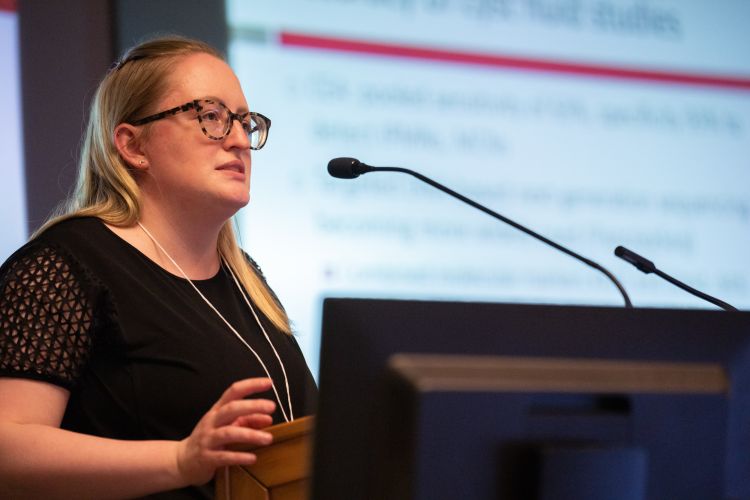Women in Medicine: Dana Ley, MD

The American Medical Association recognizes September as Women in Medicine Month, honoring the significant contributions of women to the field of health care.
Throughout the month, the Department of Medicine will feature Q&As with a handful of our own women physicians across a variety of specialties and at different stages in their careers.
Dana Ley, MD, is currently an advanced endoscopy fellow in the Division of Gastroenterology and Hepatology, having also completed her internal medicine residency and general gastroenterology fellowship with the DOM. Her professional interests include advanced and therapeutic endoscopy, endoscopic ultrasound and cholangiopancreatography.
How has being a woman shaped your career in medicine?
As a woman in medical training, I think I naturally gravitated towards interacting with mentors who were also women.
The University of Wisconsin (UW) has many strong female clinicians, researchers and mentors who were highly influential in my medical school, residency and fellowship experiences. My specialty, gastroenterology, continues to be male dominated, especially outside of academic centers. Identifying female mentors within the specialty was huge for me.
After my general gastroenterology fellowship, I decided to complete an additional year of training in advanced endoscopy. This subspecialty is even more male-dominated! My advanced endoscopy attendings here at UW have been so supportive of my decision to do this subspecialty training. I feel that advanced endoscopy is a career that will allow me to use my technical and procedural skills as well as provide empathetic care for patients with complex gastrointestinal conditions including malignancies.
It makes me happy that someday in the future, other women trainees may believe they can also have a career as an advanced endoscopist because they saw another woman do it. It is surprising how influential one positive interaction with a physician of a specific specialty could be.
Who have been your greatest personal and/or professional mentors as women in medicine, and why?
Dr. Sumona Saha has been my mentor for nearly 10 years, starting back when I was a UW medical student. Because of her, I first considered a career in gastroenterology, and I decided I wanted to be her some day! Every step of the way since, she has been a huge supporter and trusted source of advice. I respect her clinical decision-making and the dedicated way she cares for her patients. Besides all of that, she is a kind and wonderful person, and she is fun to work with.
Dr. Jennifer Weiss has been another outstanding mentor. She has gone out of her way to support me (as well as many other trainees), and she has been an excellent source of advice about establishing an academic career in medicine. She is a very successful researcher and clinician but is incredibly humble about all her accomplishments.
You and your colleague, Dr. Sarah Donohue, established the Women in Leadership and Development (WILD) certificate program for Department of Medicine (DOM) fellows in 2021. Why? How do you think it’s been successful?
During my last year of residency, my class selected Dr. Amy Oxentenko from Mayo Clinic, president elect of the American College of Gastroenterology, to give DOM Grand Rounds. Her talk highlighted some of the challenges faced by women physicians, especially in leadership roles within academic medicine.
Dr. Donohue and I were inspired. We talked about establishing a group specifically for women trainees in the DOM to discuss these challenges and learn skills to combat some of the gender-based inequities that occur in medicine. The group (WILD) has now been active for the last three years.
I personally have learned a lot from the speakers that present at our sessions. We’ve had sessions on work-life balance, contract negotiations and CV writing, to name just a few. The fellows that have been a part of WILD have developed a real sense of community and fellowship. Many fellows have shared that they were grateful to be part of the group. Discussing shared experiences as women in different specialties has been extremely helpful and affirming.
Read Dr. Donohue's perspective here.
Responses have been lightly edited for length.
Photo credit: Clint Thayer/Department of Medicine.